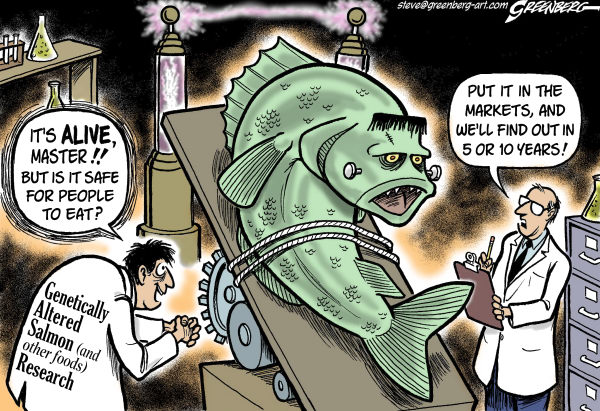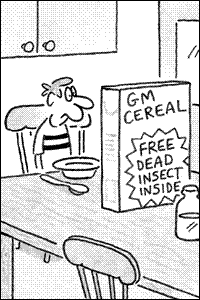|
Vocapedia
>
Earth > Gardening, Farming
Food production
Genetically modified food, GMO crops, GMOs
vs
edited food

Steve Greenberg
Freelance
Los Angeles
Editorial cartoon
Cagle
25 September 2010
gene-edited food /
gene-editing tools USA
https://www.npr.org/sections/thesalt/2019/05/
10/717273970/will-gene-edited-food-be-government-regulated
https://www.npr.org/sections/thesalt/2016/04/15/
474358416/will-genetically-edited-food-be-regulated-the-case-of-the-mushroom
podcasts > before
2024
gene-editing technology / tools > gene-edited food > Crispr-Cas9 >
agriculture, farming
https://www.nytimes.com/2020/01/08/
magazine/gene-drive-mosquitoes.html
https://www.nytimes.com/2019/06/17/
science/food-agriculture-genetics.html
https://www.nationalgeographic.com/environment/
future-of-food/food-technology-gene-editing/ - Aug. 10, 2018
https://www.nytimes.com/2018/10/05/
science/groundcherries-crispr-gene-editing.html
https://www.npr.org/sections/thesalt/2017/10/25/
559867742/amid-gmo-strife-food-industry-vies-for-public-trust-in-crispr-technology
https://www.npr.org/2017/01/12/
509482815/new-gene-editing-techniques-hold-the-promise-of-altering-the-fundamentals-of-lif
https://www.nytimes.com/2017/01/09/
science/genetically-edited-foods-crispr.html
https://www.npr.org/sections/thesalt/2016/04/15/
474358416/will-genetically-edited-food-be-regulated-the-case-of-the-mushroom
https://www.nytimes.com/2015/11/27/
us/2015-11-27-us-animal-gene-editing.html
food production > GM food UK
http://www.theguardian.com/commentisfree/video/2013/aug/06/
gm-food-video-debate
genetically modified GM
genetically modified seeds
USA
https://www.nytimes.com/2017/09/21/
business/monsanto-dicamba-weed-killer.html
GMO seeds USA
https://www.npr.org/sections/health-shots/2024/04/28/
1244374630/gmo-purple-tomato-seeds-baker-creek-controversy
grow a genetically modified purple tomato
made with snapdragon DNA
USA
https://www.npr.org/sections/health-shots/2024/02/06/
1228868005/purple-tomato-gmo-gardeners
Monsanto USA
https://www.nytimes.com/2017/09/21/
business/monsanto-dicamba-weed-killer.html
genetically modified crops > acreage
USA
http://www.nytimes.com/2016/04/13/
business/acreage-for-genetically-modified-crops-declined-in-2015.html
GM food UK
http://www.theguardian.com/commentisfree/video/2013/aug/06/
gm-food-video-debate
genetically modified food
USA
http://www.nytimes.com/2010/05/15/
opinion/15ronald.html
G.M.O. / GMO / GMOs USA
https://www.npr.org/sections/health-shots/2024/04/28/
1244374630/gmo-purple-tomato-seeds-baker-creek-controversy
https://www.npr.org/sections/thesalt/2018/05/19/
612063389/usda-unveils-prototypes-for-gmo-food-labels-and-theyre-confusing
http://www.npr.org/sections/thesalt/2016/12/02/
504034298/americans-dont-trust-scientists-take-on-food-politicians-even-less
http://www.npr.org/sections/thesalt/2016/08/03/
487905333/organic-food-fights-back-against-non-gmo-rival
http://www.npr.org/sections/thesalt/2016/05/17/
478415310/top-scientists-say-gmos-are-safe-but-dont-always-deliver-on-promises
http://www.nytimes.com/2016/05/16/
opinion/i-run-a-gmo-company-and-i-support-gmo-labeling.html
http://www.npr.org/blogs/thesalt/2014/02/04/
269479079/how-american-food-companies-go-gmo-free-in-a-gmo-world
http://opinionator.blogs.nytimes.com/2011/02/15/
why-arent-g-m-o-foods-labeled/
G.M.O. labeling USA
http://www.nytimes.com/2016/05/16/
opinion/i-run-a-gmo-company-and-i-support-gmo-labeling.html
labeling > non GMOs USA
http://www.npr.org/sections/thesalt/2016/08/03/
487905333/organic-food-fights-back-against-non-gmo-rival
G.M.O. food USA
http://www.nytimes.com/2015/04/25/
opinion/sunday/how-i-got-converted-to-gmo-food.html
GMO-free USA
http://www.npr.org/blogs/thesalt/2014/02/04/
269479079/how-american-food-companies-go-gmo-free-in-a-gmo-world
G.M.O. wheat USA
http://www.nytimes.com/2014/02/03/
opinion/we-need-gmo-wheat.html
engineered fish >
genetically modified salmon for dinner
USA
GM food UK
http://www.theguardian.com/science/2006/feb/13/gm.comment
GM maize
GM crop UK
http://www.guardian.co.uk/environment/2012/may/22/
gm-crops-protesters-battlefields
GM trial crops UK
http://www.guardian.co.uk/environment/2012/may/22/
gm-crops-protesters-battlefields
GMO crops USA
https://www.npr.org/sections/health-shots/2024/04/28/
1244374630/gmo-purple-tomato-seeds-baker-creek-controversy
GM food
anti-GM protesters UK
http://www.guardian.co.uk/environment/2012/may/22/
gm-crops-protesters-battlefields
bioengineered tomato
USA
https://www.npr.org/sections/health-shots/2024/04/28/
1244374630/gmo-purple-tomato-seeds-baker-creek-controversy
Frankenstein food / 'Frankenfood' UK
http://www.guardian.co.uk/environment/2012/may/22/
gm-crops-protesters-battlefields
http://www.theguardian.com/politics/2003/jun/15/
greenpolitics.science
genetically modified food
USA
https://www.nytimes.com/topic/subject/
genetically-modified-food
http://www.npr.org/sections/thesalt/2016/04/15/
474358416/will-genetically-edited-food-be-regulated-the-case-of-the-mushroom
http://www.nytimes.com/2011/08/19/
opinion/genetically-engineered-food-for-all.html
http://www.nytimes.com/2010/05/15/
opinion/15ronald.html
genetically modified salmon
USA
http://www.npr.org/sections/thesalt/2015/11/19/
456634593/fda-says-genetically-modified-salmon-is-safe-to-eat
http://www.npr.org/sections/thesalt/2015/06/24/
413755699/genetically-modified-salmon-coming-to-a-river-near-you
supersized genetically modified salmon
UK
http://www.guardian.co.uk/environment/2013/apr/24/
genetically-modified-salmon-aquabounty-panama-united-states
genetically 'edited' food > mushroom
USA
http://www.npr.org/sections/thesalt/2016/04/15/
474358416/will-genetically-edited-food-be-regulated-the-case-of-the-mushroom
genetically engineered salmon
USA
http://www.nytimes.com/2012/05/22/
business/kakha-bendukidze-holds-fate-of-gene-engineered-salmon.html
genetically altered salmon
USA
http://www.nytimes.com/2010/06/26/
business/26salmon.html
engineered fish > genetically modified salmon for dinner
USA
More than 80 percent
of the corn, soybeans and cotton
grown in the United States
s genetically
engineered USA
http://www.nytimes.com/2010/05/15/
opinion/15ronald.html
GMA derivative
super-fast-growing salmon
— the first genetically modified animal
to be sold in the U.S. USA
http://opinionator.blogs.nytimes.com/2011/02/15/
why-arent-g-m-o-foods-labeled/
GM DNA
GM plant
cross-pollination
hybrid superweed
hybridisation

Matt
Editorial cartoon
DT
17 October 2003
USA > Food and Drug Administration FDA
USA
http://www.npr.org/sections/thesalt/2015/11/19/
456634593/fda-says-genetically-modified-salmon-is-safe-to-eat
Engineering Food for All
August 18,
2011
The New York Times
By NINA V. FEDOROFF
Washington
FOOD prices are at record highs and the ranks of the hungry are swelling once
again. A warming climate is beginning to nibble at crop yields worldwide. The
United Nations predicts that there will be one to three billion more people to
feed by midcentury.
Yet even as the Obama administration says it wants to stimulate innovation by
eliminating unnecessary regulations, the Environmental Protection Agency wants
to require even more data on genetically modified crops, which have been
improved using technology with great promise and a track record of safety. The
process for approving these crops has become so costly and burdensome that it is
choking off innovation.
Civilization depends on our expanding ability to produce food efficiently, which
has markedly accelerated thanks to science and technology. The use of chemicals
for fertilization and for pest and disease control, the induction of beneficial
mutations in plants with chemicals or radiation to improve yields, and the
mechanization of agriculture have all increased the amount of food that can be
grown on each acre of land by as much as 10 times in the last 100 years.
These extraordinary increases must be doubled by 2050 if we are to continue to
feed an expanding population. As people around the world become more affluent,
they are demanding diets richer in animal protein, which will require ever more
robust feed crop yields to sustain.
New molecular methods that add or modify genes can protect plants from diseases
and pests and improve crops in ways that are both more environmentally benign
and beyond the capability of older methods. This is because the gene
modifications are crafted based on knowledge of what genes do, in contrast to
the shotgun approach of traditional breeding or using chemicals or radiation to
induce mutations. The results have been spectacular.
For example, genetically modified crops containing an extra gene that confers
resistance to certain insects require much less pesticide. This is good for the
environment because toxic pesticides decrease the supply of food for birds and
run off the land to poison rivers, lakes and oceans.
The rapid adoption of genetically modified herbicide-tolerant soybeans has made
it easier for farmers to park their plows and forgo tilling for weed control.
No-till farming is more sustainable and environmentally benign because it
decreases soil erosion and shrinks agriculture’s carbon footprint.
In 2010, crops modified by molecular methods were grown in 29 countries on more
than 360 million acres. Of the 15.4 million farmers growing these crops, 90
percent are poor, with small operations. The reason farmers turn to genetically
modified crops is simple: yields increase and costs decrease.
Myths about the dire effects of genetically modified foods on health and the
environment abound, but they have not held up to scientific scrutiny. And,
although many concerns have been expressed about the potential for unexpected
consequences, the unexpected effects that have been observed so far have been
benign. Contamination by carcinogenic fungal toxins, for example, is as much as
90 percent lower in insect-resistant genetically modified corn than in
nonmodified corn. This is because the fungi that make the toxins follow insects
boring into the plants. No insect holes, no fungi, no toxins.
Yet today we have only a handful of genetically modified crops, primarily
soybeans, corn, canola and cotton. All are commodity crops mainly used for feed
or fiber and all were developed by big biotech companies. Only big companies can
muster the money necessary to navigate the regulatory thicket woven by the
government’s three oversight agencies: the E.P.A., the Department of Agriculture
and the Food and Drug Administration.
Decades ago, when molecular approaches to plant improvement were relatively new,
there was some rationale for a cautious approach.
But now the evidence is in. These crop modification methods are not dangerous.
The European Union has spent more than $425 million studying the safety of
genetically modified crops over the past 25 years. Its recent, lengthy report on
the matter can be summarized in one sentence: Crop modification by molecular
methods is no more dangerous than crop modification by other methods. Serious
scientific bodies that have analyzed the issue, including the National Academy
of Sciences and the British Royal Society, have come to the same conclusion.
It is time to relieve the regulatory burden slowing down the development of
genetically modified crops. The three United States regulatory agencies need to
develop a single set of requirements and focus solely on the hazards — if any —
posed by new traits.
And above all, the government needs to stop regulating genetic modifications for
which there is no scientifically credible evidence of harm.
Nina V.
Fedoroff, who was the science and technology adviser
to the secretary of state from 2007 to 2010, is a professor
of biology at Pennsylvania State University.
Engineering Food for All,
NYT,
18.8.2011,
https://www.nytimes.com/2011/08/19/
opinion/genetically-engineered-food-for-all.html
Explore more on these topics
Anglonautes > Vocapedia
genetics > gene therapy, gene editing >
CRISPR
agriculture / farming, gardening
Earth >
animals, wildlife,
resources,
agriculture / farming,
population,
waste, pollution,
global warming,
climate change,
weather,
disasters, activists
commodities
lifestyle > food, cooking
lifestyle, health > food >
healthy food, diet,
veganism, vegetarianism
lifestyle, health >
exercise,
smoking / tobacco, vaping,
drinking / alcohol,
diet, junk food, obesity
the poor >
hunger, food
Related
The Salt - What's on
Your Plate NPR
USA
https://www.npr.org/sections/thesalt/
|